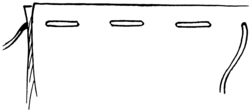AY Honors/Dressmaking/Answer Key
1. Have and review the Basic Sewing Honor.
2. Have a practical sewing box for your sewing supplies. Include in it a pin cushion, tape measure, pins, needles, thread, scissors, seam gauge and seam ripper.
These are all items you can buy in a department store or even in a thrift shop. It is also possible that you have an older relative who no longer sews and would love to give your some sewing supplies, especially if you show a real interest in learning the craft. Don't feel as though you need to buy everything on the list right away. You can spread out your acquisitions over time as you hunt for bargains.
3. Know how and when to: baste, overcast, zigzag, and blind hem.
Basting
In sewing, to baste or tack is to make quick, temporary stitching intended to be removed. Tacking is used in a variety of ways:
- To temporarily hold a seam or trim in place until it can be permanently sewn, usually with a long running stitch made by hand or machine called a tacking stitch or basting stitch.
- To temporarily attach a lace collar, ruffles, or other trim to clothing so that the attached article may be removed easily for cleaning or to be worn with a different garment. For this purpose, tacking stitches are sewn by hand in such a way that they are almost invisible from the outside of the garment.
- To transfer pattern markings to fabric, or to otherwise mark the point where two pieces of fabric are to be joined. A special loose looped stitch used for this purpose is called a tack or tailor's tack.
- A basting stitch is essentially a straight stitch, sewn with long stitches and unfinished ends. The basting stitch is used for temporarily holding sandwiched pieces of fabric in place. The stitch is removed after the piece is finished. Often used in quilting or embroidery.
Overcast
An overcast stitch is made at the edge of a piece of fabric to prevent it from unraveling. It is made by passing the needle through the top of the fabric near the edge, and then pulling the thread over the edge and passing it through the top again. The thread makes a spiral around the edge of the fabric, much as a spiral notebook is bound by a wire.
Zigzag
In sewing, a zigzag stitch is a machine stitch in a zigzag pattern. Tightly spaced zigzag stitches are used to emulate embroidery stitches such as satin stitch, and to reinforce buttonholes. A zigzag stitch is also used as a non-structural seam, to temporarily hold two panels together edge-to-edge (and eliminate the ridge that would "x-ray" through). This is done when another panel will overlay the seam and provide support.
Blind Hem
A blind hem is a stitch that is nearly invisible on the finished side of the fabric. It can be used for hemming a garment, drapes, or curtains. If done by machine, the sewing machine must have a blind stitch as well as a specialized presser foot made for this purpose.
In the machine stitch, three running stitches are alternated with one zigzag stitch. The running stitch is made in the seam, and the zigzag goes out to the edge of the hem picking up only one or two threads of the weave.

